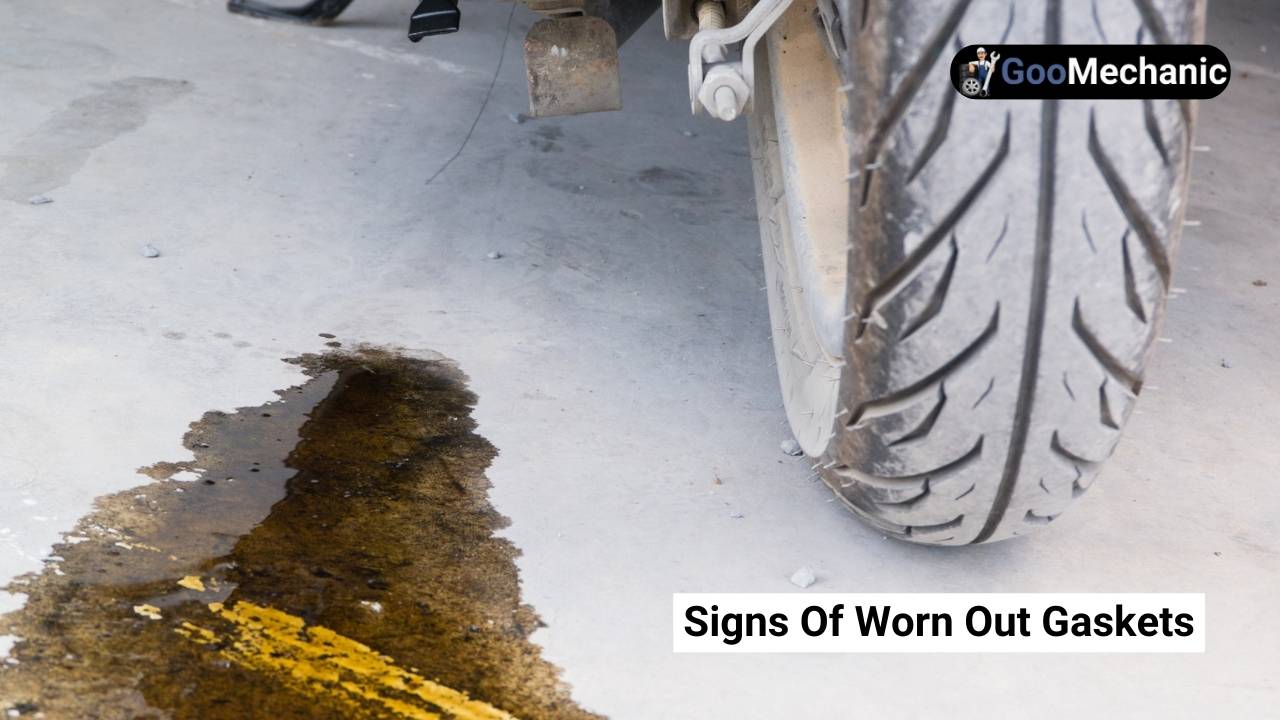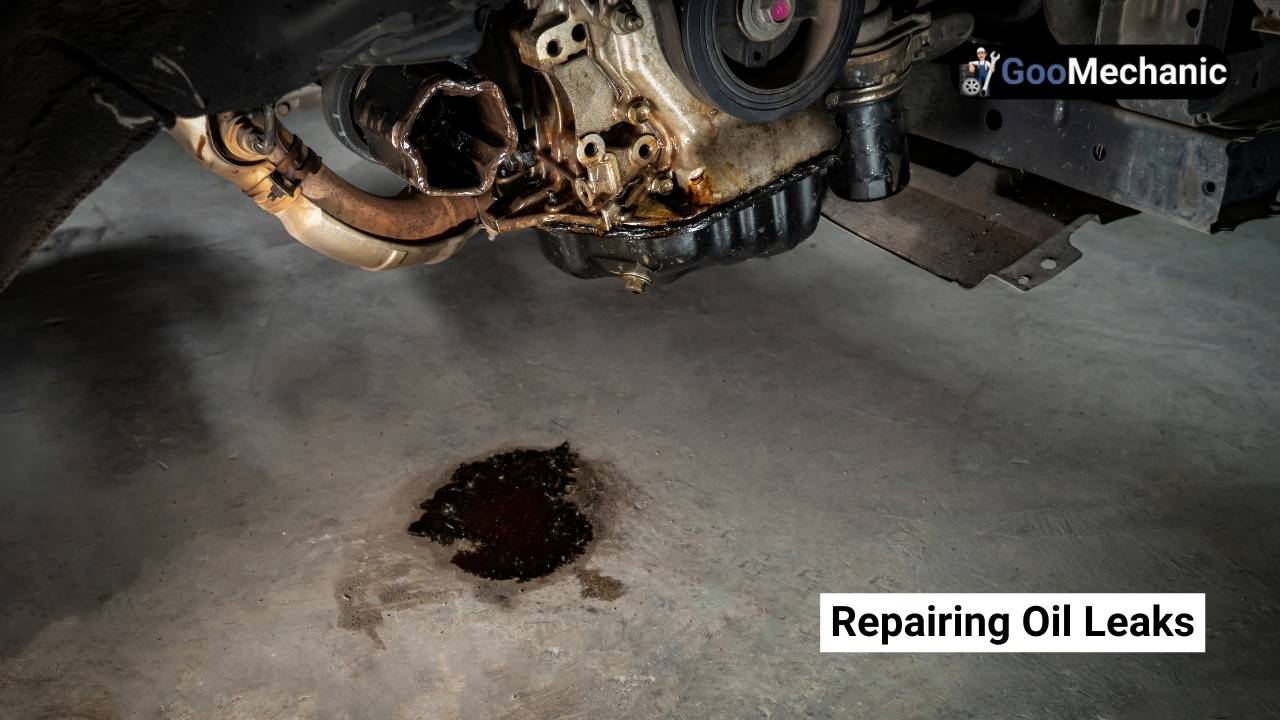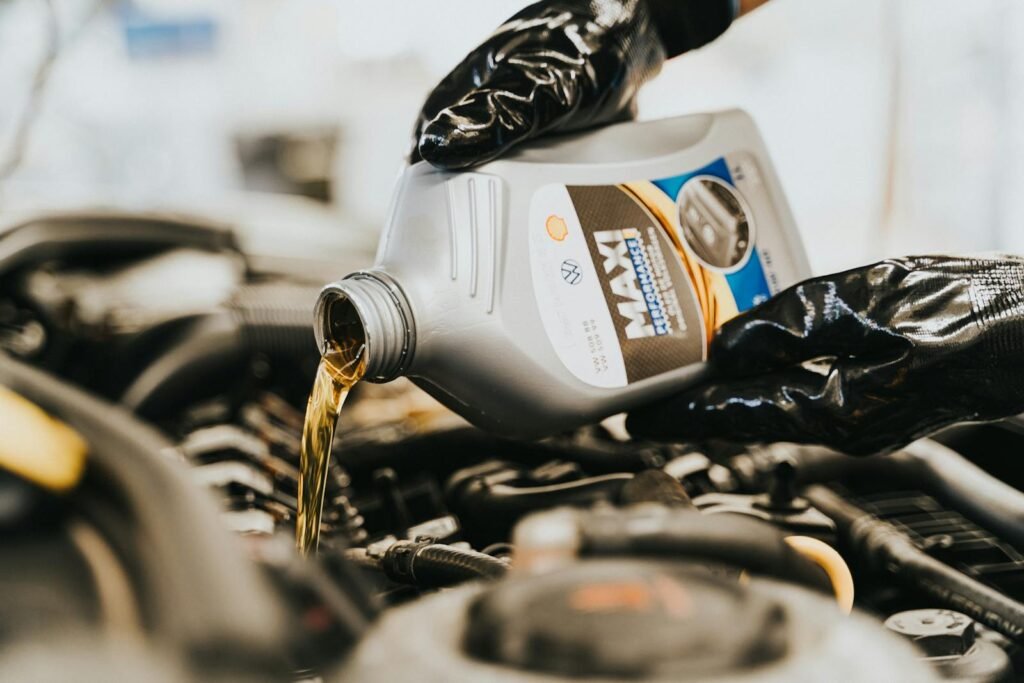Worn-out gaskets, damaged oil pan, and degraded seals can cause an oil leak in a car. These issues may lead to significant engine problems.
Oil leaks can be a major concern for car owners, potentially leading to severe engine damage. Identifying the root cause is crucial for timely repairs and preventing further complications. Worn-out gaskets are a common culprit, as they lose their sealing capability over time.
A damaged oil pan, often due to road debris or accidents, can also lead to leaks. Degraded seals, particularly around the crankshaft and camshaft, are another frequent cause. Regular maintenance and inspections can help detect these issues early, ensuring your car remains in optimal condition and avoiding costly repairs.
Common Causes Of Oil Leaks

Oil leaks in cars can lead to significant issues if not addressed. Understanding the common causes of oil leaks can help you prevent major problems. Here are three primary reasons your car might be leaking oil.
Worn Out Gaskets
Gaskets seal the engine components and prevent oil from leaking. Over time, these gaskets can wear out. When gaskets become old, they lose their ability to seal properly.
Common symptoms of worn-out gaskets include oil spots under your car and a burning oil smell. Replacing worn gaskets can prevent oil leaks and protect your engine.
Damaged Oil Pan
The oil pan holds the oil at the bottom of the engine. If the oil pan gets damaged, it can cause oil to leak. Damage can occur from road debris or hitting curbs.
A damaged oil pan often results in visible oil puddles under the car. Regularly inspect the oil pan for any signs of damage.
Loose Oil Filter
The oil filter removes contaminants from the engine oil. If the oil filter is not tight, oil can leak from the seal. A loose oil filter is often caused by improper installation.
Check the oil filter after an oil change to ensure it is secure. Tightening the filter can prevent leaks and maintain engine health.
Signs Of Worn Out Gaskets

Worn out gaskets can cause significant oil leaks in your car. Recognizing the signs early can prevent further damage. Below are some key indicators of worn-out gaskets.
Visible Oil Spots
If you notice oil spots under your car, the gaskets might be worn out. Gaskets seal various parts of the engine. When they wear out, they can leak oil. Check under your car for fresh oil spots. This is a clear sign of trouble.
Engine Overheating
An overheating engine could indicate worn-out gaskets. Gaskets help keep the engine cool. When they fail, the engine may overheat. Look at your temperature gauge. If it shows high temperatures, check your gaskets. This can prevent further engine damage.
| Sign | Description |
|---|---|
| Visible Oil Spots | Oil stains beneath the car indicate gasket issues. |
| Engine Overheating | High engine temperatures suggest failing gaskets. |
How A Damaged Oil Pan Leads To Leaks
A damaged oil pan is a common reason for oil leaks in cars. This essential component holds the engine’s oil supply. When it gets damaged, leaks occur, leading to engine troubles. Let’s explore how a damaged oil pan can cause leaks.
Road Debris Impact
Road debris often hits the oil pan. Rocks, trash, and other items can cause damage. This impact can create holes or cracks in the pan. These holes allow oil to seep out, leading to leaks.
The oil pan sits low in the car. This makes it an easy target for debris. Even a small dent can cause oil to escape. Regular checks can prevent long-term damage.
Pan Corrosion
Corrosion is another cause of oil leaks. Over time, the oil pan can rust. This rust weakens the pan, causing holes to form. These holes let oil drip out, leading to leaks.
Moisture and road salt speed up corrosion. Cars in wet or snowy areas face higher risks. Regular cleaning and inspections help catch early signs of rust.
| Cause | Description |
|---|---|
| Road Debris Impact | Debris hits the oil pan, causing holes and cracks. |
| Pan Corrosion | Rust forms on the oil pan, creating holes. |
Effects Of A Loose Oil Filter
A loose oil filter can lead to significant problems in your car. It causes oil leaks, which can affect engine performance. Understanding the common issues with oil filters helps you maintain your vehicle better.
Improper Installation
Improper installation is a frequent cause of a loose oil filter. If the filter is not tightened correctly, it can loosen over time.
- Hand-tighten the filter to ensure proper fit.
- Use a filter wrench for an extra secure fit.
- Check for gaps or misalignments during installation.
Filter Wear And Tear
Oil filters undergo wear and tear over time. This wear can lead to a loose fit and cause leaks.
| Issue | Effect |
|---|---|
| Rubber gasket wear | Leads to poor sealing |
| Filter material degradation | Reduces filtration efficiency |
Regularly replace the oil filter to avoid these issues.
Preventing Oil Leaks
Preventing oil leaks in your car is essential. It helps maintain your car’s health. Regular checks and timely replacements can save you from bigger problems.
Regular Maintenance
Regular maintenance is key to preventing oil leaks. Always check your car’s oil levels. Low oil levels can lead to engine damage. Inspect the oil filter and oil pan for any signs of leakage. Oil filters can get clogged over time. This can cause oil leaks. Clean or replace them as needed.
Timely Replacements
Replace old or worn-out parts on time. Gaskets and seals can wear out and cause leaks. Check and replace them regularly. Oil changes should be done as per the car’s manual. Old oil can break down and cause leaks.
| Part | Frequency of Check | Action |
|---|---|---|
| Oil Filter | Every 3 months | Clean or Replace |
| Gaskets | Every 6 months | Inspect and Replace |
| Oil Levels | Monthly | Check and Refill |
Follow these steps to keep your car in top shape. Preventing oil leaks is easy with regular maintenance and timely replacements.
Identifying An Oil Leak
Identifying an oil leak in your car is crucial. It helps prevent engine damage and costly repairs. Early detection can save you from bigger issues. Here are some signs to look out for:
Oil Stains Under Car
One of the easiest ways to spot an oil leak is by checking for oil stains under your car. These stains are usually dark brown or black. They often appear on your driveway or parking spot. If you see fresh oil spots, it’s a clear sign of a leak.
To be sure, place a piece of cardboard under your car overnight. In the morning, check the cardboard for any oil stains. This simple test can help you confirm the presence of a leak.
Oil Smell Inside Car
Another sign of an oil leak is a strong oil smell inside the car. This smell can be quite distinct and unpleasant. It often indicates that oil is leaking onto hot engine parts. Burning oil can produce a noticeable odor.
If you detect this smell, it’s important to check your engine bay. Look for any visible signs of oil leakage around the engine. Addressing this issue promptly can prevent further damage.
Repairing Oil Leaks

Oil leaks can cause serious problems for your car. They can damage your engine and harm the environment. Repairing them quickly is important. There are different ways to fix oil leaks. Some you can do yourself, others need a professional.
Diy Fixes
Some oil leaks can be fixed at home. Here are some steps to try:
- Check the oil filter: Make sure it is tight. Replace it if needed.
- Inspect the oil pan: Look for cracks or loose bolts. Tighten or replace them.
- Use oil leak sealants: These products can seal small leaks. Follow the instructions on the package.
DIY fixes can save money. But they may not work for all leaks. If the leak is large, seek professional help.
Professional Services
Some oil leaks require expert repair. Here are services professionals provide:
| Service | Description |
|---|---|
| Engine gasket replacement | Replace worn-out gaskets that cause leaks. |
| Seal replacement | Fix leaks from worn seals around the engine. |
| Professional inspection | Thoroughly check the engine for hidden leaks. |
Professional services ensure the job is done right. They use special tools and have expert knowledge. This can prevent future leaks and protect your car.
Consequences Of Ignoring Oil Leaks
Ignoring oil leaks in your car can lead to serious problems. These problems can affect your car’s performance and the environment. Here are the main consequences you should know about.
Engine Damage
An oil leak can cause severe engine damage. Oil keeps the engine parts lubricated. Without enough oil, the engine parts can wear out quickly. This can lead to overheating and even engine failure. Repairing or replacing an engine is very expensive. Regular checks can help avoid this costly repair.
Environmental Impact
Oil leaks are harmful to the environment. Leaked oil can contaminate soil and water. This can harm plants, animals, and even people. Cleaning up oil spills is also very costly. Using proper maintenance can help protect the environment.
Safety Risks
Driving with an oil leak can be dangerous. Oil can drip onto the ground, making it slippery. This increases the risk of accidents. Oil leaks can also lead to engine fires. Keeping your car in good condition is important for your safety.
Frequently Asked Questions
What Is The Most Common Cause Of An Oil Leak?
The most common cause of an oil leak is a worn-out gasket. Gaskets seal engine parts and prevent leaks.
Where Are The Three Most Common Places For An Oil Leak To Be Found?
The three most common places for an oil leak are the oil pan gasket, valve cover gasket, and oil filter.
How To Know Where An Oil Leak Is Coming From?
Identify the oil type and check under the car for drips. Inspect gaskets, seals, and oil filter. Clean and recheck.
How Expensive Is It To Fix An Oil Leak?
Fixing an oil leak can cost between $100 and $2,000. The price depends on the leak’s location and severity.
Conclusion
Addressing oil leaks promptly can save you money and extend your car’s life. Regular maintenance is crucial. Keep an eye on oil levels and seals. By understanding common causes, you’re better prepared to prevent and address leaks. Stay proactive to ensure your vehicle runs smoothly and efficiently.
